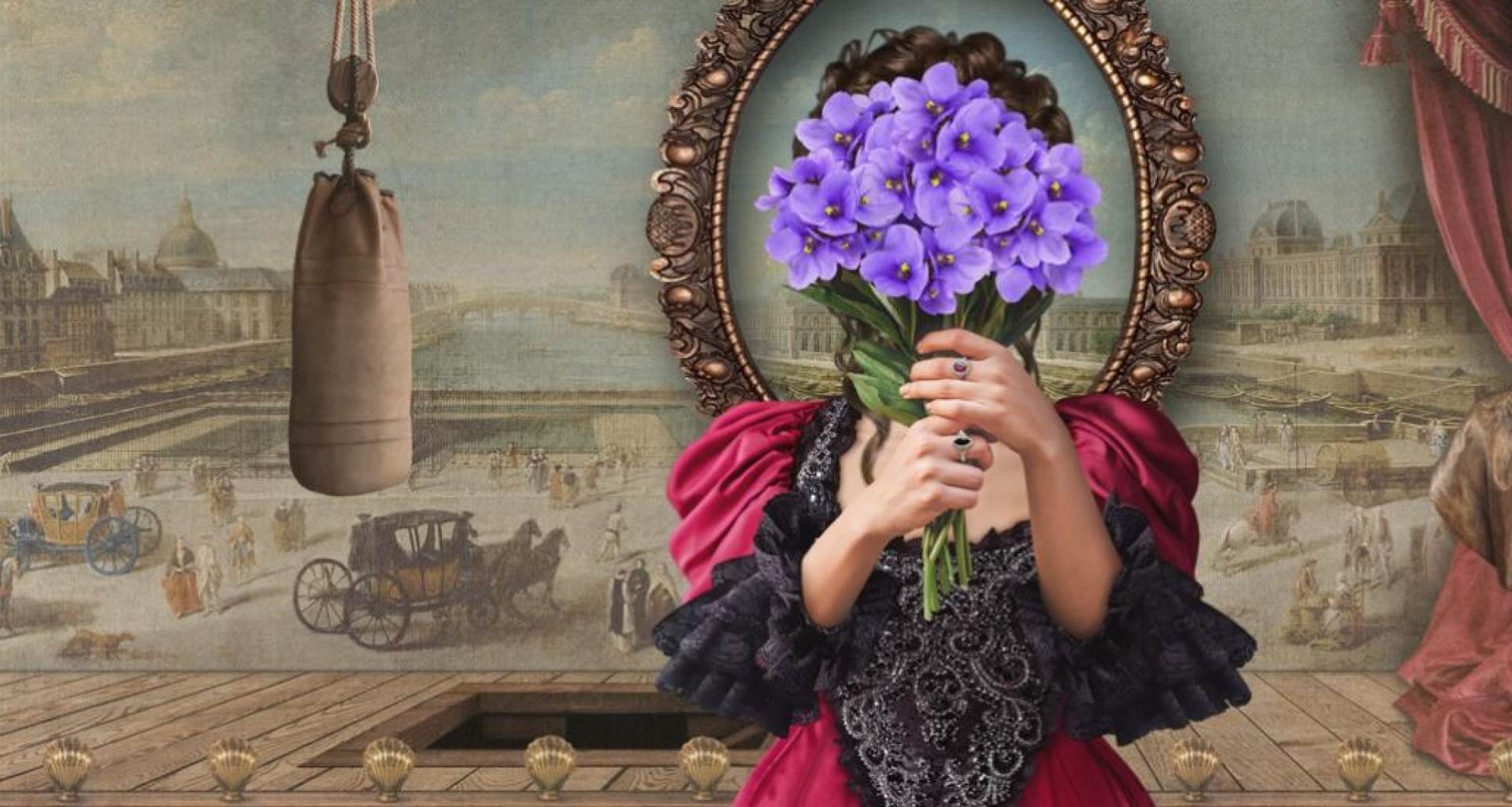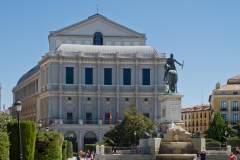Adriana Lecouvreur - Opera
Mo | Tu | We | Th | Fr | Sa | Su |
Opera in four acts
Music by Francesco Cilea (1866-1950)
Libretto by Arturo Colautti, based on the play of the same name by Eugène Scribe and Ernest Legouvé
Adriana Lecouvreur comes to the Teatro Real stage for the first time in David McVicar's captivating production. Theatre and music combine with period touches, featuring a stellar cast including Ermonela Jaho, Maria Agresta and Elīna Granča.
Synopsis
Place: Paris, France
Time: 1730
Act 1
Backstage at the Comédie-Française
The company is preparing for a performance and bustling around Michonnet, the stage manager. The Prince de Bouillon, admirer and patron of the actress Duclos, is also seen backstage with his companion, the Abbé. Adriana enters, reciting, and replies to the others' praise with 'Io son l'umile ancella' ("I am the humble servant of the creative spirit"). Left alone with Adriana, Michonnet wants to express his love for her. However, Adriana explains that she already has a lover: Maurizio, a soldier of the Count of Saxony. Maurizio enters and declares his love for Adriana, 'La dolcissima effigie.' They agree to meet that night, and Adriana gives him some violets to put in his buttonhole. The Prince and the Abbé return. They have intercepted a letter from Duclos, in which she requests a meeting with Maurizio later that evening at the Prince's villa. The Prince, hoping to expose the tryst, decides to invite the entire troupe there after the performance. On receiving Duclos's letter, Maurizio cancels his appointment with Adriana, who in turn opts to join the Prince's party.
Act 2
A villa by the Seine
The Princess de Bouillon, not the actress Duclos (who was only acting as her proxy), is anxiously waiting for Maurizio ("Acerba voluttà, dolce tortura"). When Maurizio enters, she sees the violets and asks how he came by them. Maurizio presents them to her, but confesses that he no longer loves her. She deduces that he loves someone else, but soon she's forced to hide when the Prince and the Abbé suddenly arrive. Maurizio realizes that they think he is with Duclos. Adriana enters and learns that Maurizio isn't a soldier at all, but the disguised Count of Saxony himself. He tells Adriana the assignation was political, and that they must arrange the escape of a woman who is in hiding nearby. Adriana trusts him and agrees to help. During the intermezzo that follows, the house is darkened, and Adriana tells the Princess that this is her opportunity to escape. However, the two women are mutually suspicious, and the rescue attempt turns into a blazing quarrel before the Princess finally leaves. Michonnet, the stage manager, discovers a bracelet dropped by the Princess, which he gives to Adriana.
Act 3
The Hôtel de Bouillon
The Princess is desperate to discover the identity of her rival. The Prince, who has an interest in chemistry, is storing a powerful poison that the government has asked him to analyze. The couple host a reception, at which guests note the arrival of Michonnet and Adriana. The Princess thinks she recognizes the latter's voice, and announces that Maurizio has been wounded in a duel. Adriana faints. Soon afterwards, however, when Maurizio enters uninjured, Adriana is ecstatic. He sings of his war exploits ("Il russo Mencikoff"). A ballet is performed: the 'Judgement of Paris.' Adriana learns that the bracelet Michonnet found belongs to the Princess. Realizing that they are rivals for Maurizio's affection, the Princess and Adriana challenge each other. When the former pointedly suggests that Adriana should recite a scene from 'Ariadne Abandoned', the Prince asks instead for a scene from 'Phèdre'. Adriana uses the final lines of the text to make a headstrong attack on the Princess, who swears to have her revenge.
Act 4
A room in Adriana's house
It's Adriana's name day, and Michonnet is waiting in her home for her to awaken. Adriana is consumed with anger and jealousy. Her colleagues come to visit, bringing her gifts and trying to persuade her to return to the stage. One of these gifts is a diamond necklace, recovered by Michonnet, which Adriana had pawned to help pay off Maurizio's debts. A small casket arrives. It contains a note from Maurizio, along with the violets Adriana had given him at the theater. Adriana, hurt, kisses the flowers ("Poveri fiori") and throws them into the fire. Maurizio enters, hoping to marry her. They embrace, and he notices that she's shaking. She quickly becomes deranged, and Michonnet and Maurizio - who'd presented the violets to the Princess - realize that Adriana has been poisoned. For a moment, she becomes lucid again ("Ecco la luce"), then dies.
Program and cast
Artistic team
Musical conductor: Nicola Luisotti
Stage direction: David McVicar
Set design: Charles Edwards
Costumes: Brigitte Reiffenstuel
Lighting: Adam Silverman
Choreography: Andrew George
Chorus master: José Luis Basso
Cast
Adriana Lecouvreur: Ermonela Jaho __ 23, 26, 29 sept; 2, 5, 8, 11 oct
Maria Agresta __ 25, 28 sept; 1, 4, 7, 10 oct
Maurizio: Brian Jagde __ 23, 26, 29 sept; 2, 5, 8, 11 oct
Matthew Polenzani __ 25, 28 sept; 1, 4, 7, 10 oct
The Prince de Bouillon: Maurizio Muraro
The Princess de Bouillon: Elīna Garanča __ 23, 26, 29 sept; 2, 5, 8, 11 oct
Ksenia Dudnikova __ 25, 28 sept; 1, 4, 10 oct
Teresa Romano __ 7 oct
Michonnet: Nicola Alaimo __ 23, 26, 29 sept; 2, 5, 8, 11 oct
Manel Esteve __ 25, 28 sept; 1, 4, 7, 10 oct
Quinault: David Lagares
Poisson: Vicenç Esteve
Mademoiselle Jouvenot: Sylvia Schwartz
Mademoiselle Dangeville: Monica Bacelli
Abate de Chazeuil: Mikeldi Atxanlandabaso __ 23, 26, 29 sept; 2, 5, 8, 11 oct
Josep Fadó __ 25, 28 sep; 1, 4, 7, 10 oct
Chorus and Orchestra of the Teatro Real
In tribute to José Carreras on the occasion of the 50th anniversary of his performance of Adriana Lecouvreur in Madrid, at the Teatro de la Zarzuela (1974), with Montserrat Caballé.
Teatro Real
The Teatro Real is Spain's leading opera house. It is considered to be the top institution in the country in the music and performing arts field.
The Teatro Real Foundation is chaired by the King and Queen of Spain. It relies on two public administrations that took part in its creation: the Ministry of Education, Culture and Sports, and the Comunidad de Madrid (Regional Government of Madrid). The Foundation is governed by a Board of 31 trustees. The Board of Trustees elects the President of Board and the Executive Commission as proposed by the Ministry of Education, Culture and Sport. The Foundation is a public entity and there is an important role played by civil society in its governance and sponsorship.
The objective of the Teatro Real is to create a venue for the most talented singers, conductors ands stage directors from around the world. Its artistic mission is expressed in programming which seeks excellence by combining classical and contemporary lyrical repertory to appeal to audiences of all ages and interests. Introducing young people and children to opera is of particular concern. All this, along with the Principal Chorus and Orchestra of the Teatro Real, the most up to date technological expertise and the large number of in house productions on stages around the world has firmly positioned the Teatro Real in Spain and abroad.

 EN
EN DE
DE IT
IT FR
FR ES
ES RU
RU JP
JP RO
RO
 Seating plan
Seating plan 